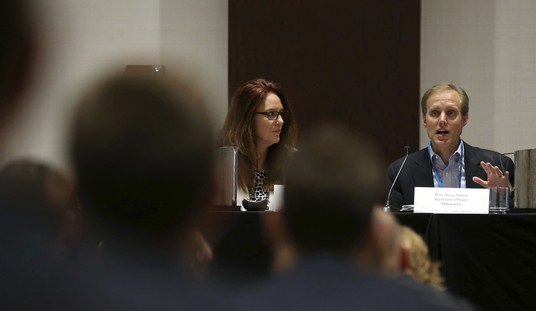No worries. It’s moderate shari’a.
“Any law that violates sharia is null and void legally,” he said, citing as an example the law on marriage passed during the slain dictator’s 42-year tenure that imposed restrictions on polygamy, which is permitted in Islam.
“The law of divorce and marriage… This law is contrary to sharia and it is stopped,” Abdel Jalil said.
His comments have provoked criticism and calls for restraint both in Libya and in Europe, amid fears that the Arab Spring may give rise to a potentially intolerant Islamist resurgence.
Many Libyans awaiting Sunday’s historic speech expressed surprise at the decision by the National Transitional Council leader to mention the role of sharia law in the new country before addressing such important issues as security and education.
Among the new shari’a-ized institutions will be Libya’s marriage laws, which means, among other things, legalizing polygamy and eliminating women’s right to keep the family home in cases of divorce. Said one Libyan feminist who’s already afraid to give reporters her full name, “We did not slay Goliath so that we now live under the Inquisition.” A State Department spokesman, when asked about NATO’s glorious triumph in birthing a new Islamic republic in north Africa, wheezed, “The term [shari’a] has broad application and is understood differently.” Translation: Hopefully it won’t be as bad as Saudi Arabia. Hopefully.
I’ll give you three reasons why you should feel only mostly, rather than totally, terrible about this. One: It’s inevitable. Whatever meager civic institutions existed in Egypt and Libya before Mubarak and Qaddafi have long since disintegrated. In Libya, especially, they’re basically rebuilding society from scratch, so no surprise that they’d turn to their one common bond as a foundation, especially when that common bond comes with a ready-made legal code built into it. And if you agree with Reuel Marc Gerecht that all societies follow the same basic civic learning curve — although some take much longer than others to advance — then a period of Islamist fascist rule is all part of the lesson on the way to something better. (Iran, of course, has been there and done that.) As Gerecht once put it, “you don’t get to arrive at Thomas Jefferson unless you first pass through Martin Luther.” Let’s hope so. And let’s hope it takes less than 250 years this time.
Two: It might not matter on the ground. It’s hard to believe Libya will escape a loyalist insurgency and/or tribal warlordism, so the next few years will be sunk in chaos and infighting whatever the country’s formal legal regime might be. That’s a horrible outcome in its own right, but the risk of some Khomeini-esque charismatic leader consolidating power and building a jihadi military threat are way less than the risk of Libya fracturing between Islamists and their political enemies in a civil war a la 90s Afghanistan or Somalia today. Wherever there’s chaos and Islamists with guns, there’s bound to be plenty of Al Qaeda creeping around and looking for a place to hide out, so consider NATO’s drone campaign against Qaddafi this year a warm-up for the big jihadi whack-a-mole operation to come. Silver lining: We know the terrain now! Meanwhile, in Egypt, you’ve got an entrenched military that will be loath to cede power to Islamists, whether democratically elected or not, if it would mean jeopardizing its economic interests. Venality is still a nice hedge against fundamentalism, even after the Arab Spring. The Egyptian army likely won’t let the Muslim Brotherhood do anything too nutty that might put it, or its business, in harm’s way.
Three: Arab voters will want to see progress quickly after elections are held and, given the state of north Africa’s economy, the odds of that happening are vanishingly small. And you know who that doesn’t benefit? Tunisia’s Islamists sure do:
If official results, which may be released as early as Tuesday, support those results, it would be a substantially better showing for the Islamists than many predicted. The center-left Tekatil Party and a party lead by a leading human-rights activist, the Congress Party for the Republic, looked set to come in second and third. The party most predicted to place second, the staunchly secular Progressive Democratic Party and Nahda’s most outspoken critics, did far worse than expected…
Inside the party’s offices, meanwhile, Nahda’s leaders had already begun wrestling with the burden of their unexpected success. An aide handed Nahda politburo member Said Ferjani a memo from a party number cruncher who predicted the party would win 50% to 55% of seats in the incoming assembly.
“This is bad news if it’s true,” Mr. Ferjani said.
Many in the party fear such a dominant showing for Nahda could spur rivals to join forces against it and leave Nahda holding the blame when Tunisians’ high expectations go unmet.
A spokesman for the secularist party said, sarcastically, “We congratulate the winning party and wish them good luck fulfilling their promises to meet the demands of the poor and unemployed within a year.” Groups like Nahda and the Muslim Brotherhood are telling people that Islam is the answer to their troubles, economic and otherwise, so give ’em a good hard dose and let them see how well it works in practice. And if, as expected, the ruling parties end up canceling the next election after public opinion about them sours, that’s all part of Gerecht’s learning curve. If he’s right, this will all work out — eventually — when the Islamists are themselves dislodged via some sort of Green Revolution and something comparatively more secular and liberal replaces them. My hunch is that it won’t work that way, that the lesson gleaned from Islamists governing horribly and then canceling elections will be that elections don’t work rather than “Islamism doesn’t work.” And Gerecht’s model tacitly assumes that the makings of a more liberal society are there if the right leadership is installed. I’m skeptical about that for the same reason as Spengler, writing about Egypt a few weeks ago: “Western economists can concoct all the economic recovery plans in the world, but a country that can’t teach half its people to read, and can’t produce employable university graduates, and can’t feed itself, is going to go down the drain.” So the Islamists will fail — and then the moderate regime that replaces them will fail, so who knows what the real next stop on this learning curve is. Only one thing is certain: Given the region’s track record, it’ll be awesome.
If you missed it in Headlines, here’s video of a Libyan rebel apparently sodomizing Qaddafi with a knife. A thought no human being ever had prior to a few days ago: “You know, I almost feel a little bad for Qaddafi.”








Join the conversation as a VIP Member